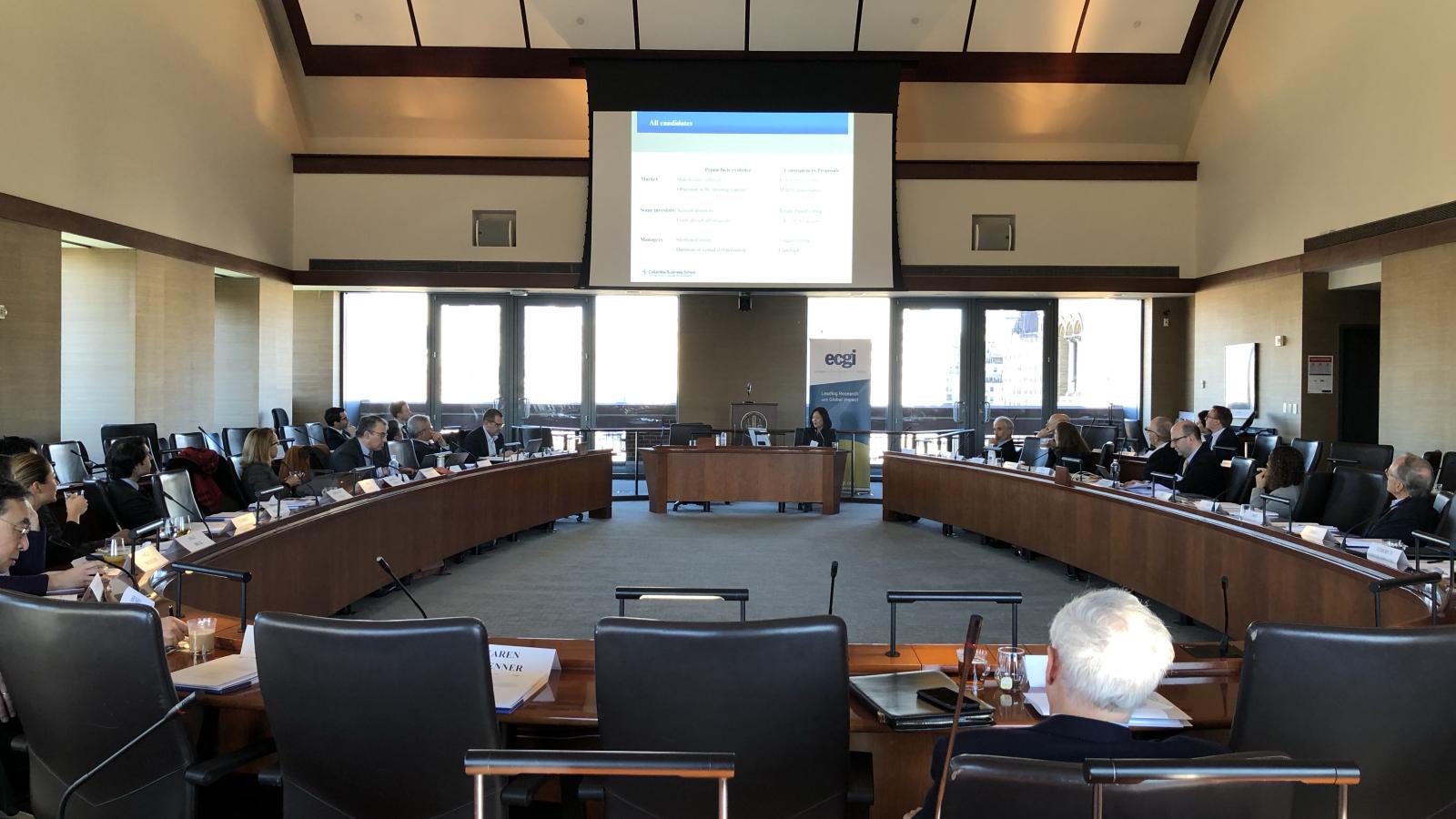Loyalty Shares: Limited Use Structure or Corporate Game Changer?

At a time when dual class share structures have come under regular attack by investors, the concept of loyalty shares, popularised in France and several other European countries, has been increasingly presented as an alternative structure for encouraging long-term ownership. A roundtable, organised by the European Corporate Governance Institute (ECGI) and NYU Law, took place in New York on 7 December 2018 to discuss some of the supporting and opposing arguments surrounding the concept.
Loyalty shares, which confer additional voting rights or additional cash-flow rights over a certain period of time, have a long tradition in France where they have replaced ‘one share one vote’ as the default share structure since April 2016. There, shareholders receive double voting rights if they have held the shares uninterruptedly for at least two years. It has been argued however, that the story in France, is one of the French state using its power as a government to increase its power as a shareholder. The European implementation of loyalty shares was the subject of an earlier roundtable in Brussels on 18 June 2018 (see report here) which led to a further discussion on how the same structure may or may not become popular in the US in time.
The roundtable at NYU highlighted the main differences between loyalty voting shares and dual class structures to be (1) loyalty shares constitute a single class of shares, that is potentially available to all shareholders; (2) the extra votes are not perpetual and expire upon a sale; (3) the extra votes depend on the holding period of the individual shareholder and the holding period of other shareholders[1]; and (4) they can be less transparent than dual class share structures.
The arguments supporting loyalty shares included the fact that they facilitate index inclusion (having only one class of shares) and additional votes of insiders are not transferable (they are lost when the shares are sold). In addition, some participants noted that traditional venture capitalists dislike dual class structures, investors are willing to invest in a wide range of voting structures, and there is no evidence that firm value is affected or that holding periods are significantly different when alternative voting structures are in place. Loyalty voting shares can be seen as an intermediate solution between “one share, one vote” and dual class structures.
However, the balanced discussion that took place at the roundtable also highlighted many of the drawbacks of loyalty share structures as they currently exist in the market. These included arguments about reduced transparency, being more opaque and difficult to calculate, creating an obstacle for securities lending (thereby making it difficult for index funds to use them), the fact that control enhancing mechanisms can also protect incompetency, insulate management and deter outside ideas, that the registration practicalities in some exisiting structures can make immediate liquidity impossible, and direct client ownership would be an issue for institutional investors. In addition, regulators could decide to prevent the largest institutional investors from taking up extra voting power.
A potential catalyst for the increased use of alternative voting structures in the US is the proposed long-term voting system of the LTSE (Long-Term Stock Exchange). Their goal is to solve the problem of short-termism, not to entrench management or prevent shareholder activism, and alternative voting structure ideas are only part of the proposed solution. As previously proposed in a 2018 SEC filing, LTSE’s structure would allow long-term shareholders to opt-in to long-term status through the existing direct registration system, using software designed by LTSE that would help to address potential concerns about any administrative burden. The system would allow shareholders to move in or out within one to three days, in contrast to registering or deregistering one’s shares in France, which could take a few months. Shareholders would forfeit their accrued voting rights if they opt-out of the registration system on a last-in-first-out basis. LTSE characterizes the proposed voting system as a more democratic alternative to dual class share structures (which would also be permitted as they are on every other US exchange).
The roundtable also posed some interesting questions regarding the future implementation of loyalty shares in the US; Could it change the strategy of investors, for example prompting hedge funds to go more long-term to benefit from tenure voting, as they did with appraisal litigation? Could it make ‘investor-friendly’ institutional investors less friendly due to the increased leverage created by loyalty voting rights? Should sunset provisions apply? What would be the impact on fiduciary duties of directors? What effect would it have on the influx of venture capital, the increased ownership of institutional investors and the increase in shareholder activism?
The roundtable provided a useful platform to discuss the various cases, evidence and theoretical applications and obstacles to using loyalty shares.
[1] In the unlikely event that all shareholders have the same holding period tenure voting is equivalent to “one-share-one-vote”.
A full summary report of the event is available here:
Click here to visit the event page
***********
Contact:
Elaine McPartlan Head of Conferences, Membership & Administration European Corporate Governance Institute (ECGI) +32 2 550 2340
|
Professor Marco Becht Executive Director European Corporate Governance Institute (ECGI) +32478406156
|
About the European Corporate Governance Institute (ECGI)
The ECGI is an international scientific non-profit association which provides a forum for debate and dialogue focusing on major corporate governance issues and thereby promoting best practice. It is the home for all those with an interest in corporate governance offering membership categories for academics, practitioners, patrons and institutions.
Its primary role is to undertake, commission and disseminate research on corporate governance. Based upon impartial and objective research and the collective knowledge and wisdom of its members, it can advise on the formulation of corporate governance policy and development of best practice. In seeking to achieve the aim of improving corporate governance, ECGI acts as a focal point for academics working on corporate governance in Europe and elsewhere, encouraging the interaction between the different disciplines, such as economics, law, finance and management.
The ECGI Roundtable Series
The ECGI Roundtable Series provides an engagement platform between ECGI Research Members and Institutional or Patron Members of ECGI. The topics are selected based on geographic relevance and the interests of the participating members. For queries about hosting or taking part in an ECGI Roundtable, contact Prof. Marco Becht, ECGI Executive Director. Click here to learn more about becoming an Institutional Member of ECGI.
